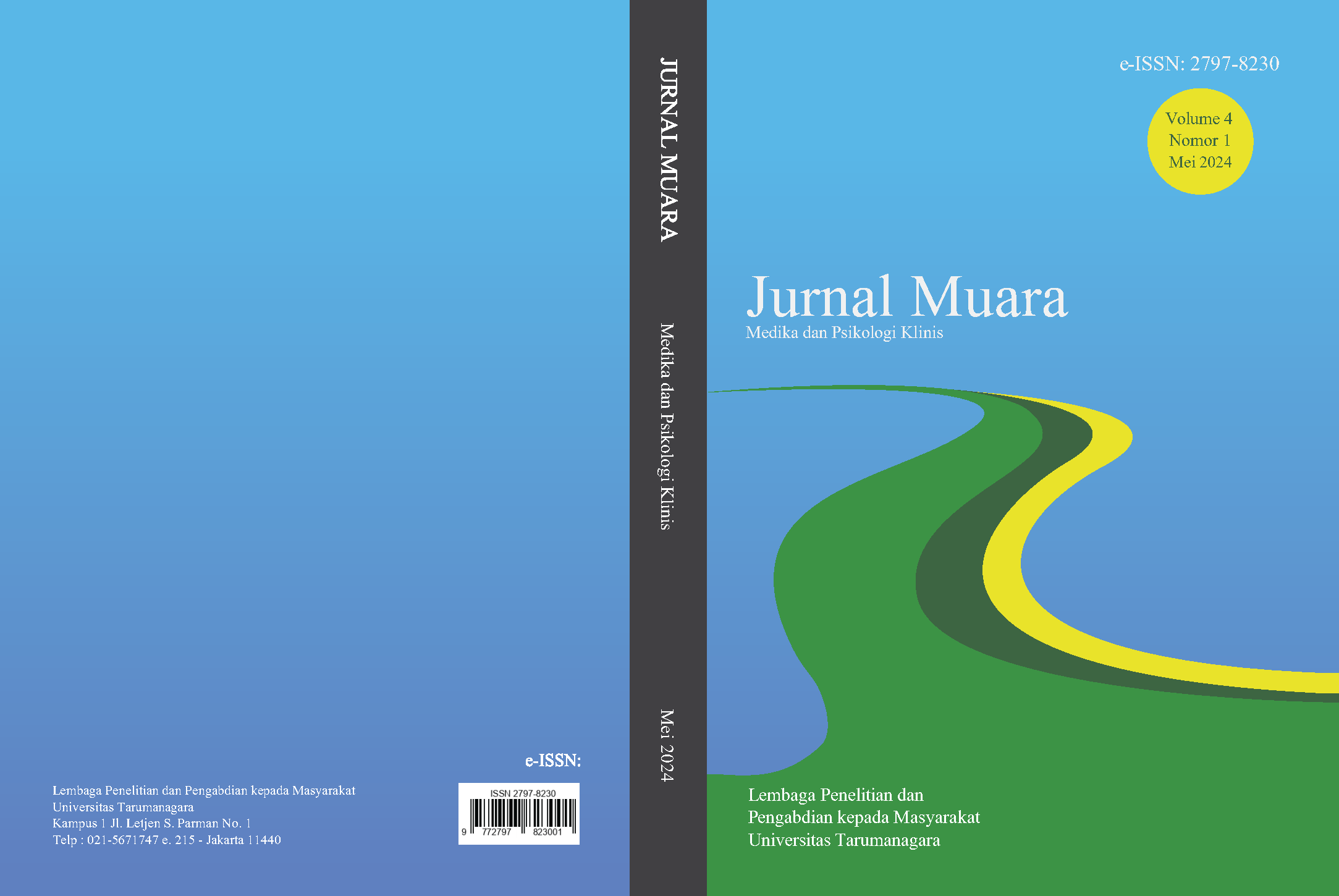ASSOCIATION OF GLOMERULAR FILTRATION RATE AND DIABETES PARAMETERS WITH SYMPTOMATIC GERD IN THE ELDERLY POPULATION
Main Article Content
Abstract
Background: Gastroesophageal reflux disease (GERD) is common in the elderly, with diabetes and impaired kidney function being potential contributing factors. Poor blood glucose control and declining glomerular filtration rate (GFR) may influence GERD symptoms through metabolic disturbances, delayed gastric emptying, and esophageal dysfunction. Purpose: This study aims to analyze the relationship between GFR, diabetes parameters, and symptomatic GERD in the elderly population to provide insights into their clinical significance. Methods: A cross-sectional study was conducted in 2024 with 93 elderly residents of Bina Bhakti Nursing Home, recruited through total sampling. Symptomatic GERD was assessed using the GERD-Q questionnaire, while GFR was estimated using the CKD-EPI equation. diabetes parameters, including fasting blood glucose, HbA1c, and fasting insulin, were measured via venous blood sampling. Spearman’s correlation test was used to determine associations between these variables. Results: Fasting blood glucose significantly correlated with GERD-Q scores (r = 0.223, p = 0.031), indicating that higher glucose levels were associated with more severe GERD symptoms. However, eGFR (r = 0.034, p = 0.750), HbA1c (r = 0.106, p = 0.310), and fasting insulin (r = -0.075, p = 0.475) demonstrated weak and statistically insignificant correlations with GERD severity. Age also had no significant relationship with GERD-Q scores (r = 0.015, p = 0.884). Conclusion: Poor blood glucose control is significantly associated with GERD severity in the elderly, whereas kidney function and other diabetes parameters show weaker correlations. Optimizing glycemic control may help reduce GERD symptoms and improve overall health outcomes in the elderly population.
Article Details
Section

This work is licensed under a Creative Commons Attribution-NonCommercial-ShareAlike 4.0 International License.
This work is licensed under a Jurnal Muara Ilmu Ekonomi dan Bisnis Creative Commons Attribution-ShareAlike 4.0 International License.How to Cite
References
Alshammari, S. A., Alabdulkareem, A. M., Aloqeely, K. M., Alhumud, M. I., Alghufaily, S. A., Al-Dossare, Y. I., & Alrashdan, N. O. (2020). The Determinants of the Quality of Life of Gastroesophageal Reflux Disease Patients Attending King Saud University Medical City. Cureus. https://doi.org/10.7759/cureus.9505
Alsuwat, O. B., Alzahrani, A. A., Alzhrani, M. A., Alkhathami, A. M., & Mahfouz, M. E. M. (2018). Prevalence of Gastroesophageal Reflux Disease in Saudi Arabia. Journal of Clinical Medicine Research, 10(3), 221–225. https://doi.org/10.14740/jocmr3292w
Chait, M. M. (2010). Gastroesophageal reflux disease: Important considerations for the older patients. World Journal of Gastrointestinal Endoscopy, 2(12), 388. https://doi.org/10.4253/wjge.v2.i12.388
Kase, H., Hattori, Y., Sato, N., Banba, N., & Kasai, K. (2008). Symptoms of gastroesophageal reflux in diabetes patients. Diabetes Research and Clinical Practice, 79(2), e6–e7. https://doi.org/10.1016/j.diabres.2007.08.019
Krishnan, B. (2013). Gastrointestinal complications of diabetes mellitus. World Journal of Diabetes, 4(3), 51. https://doi.org/10.4239/wjd.v4.i3.51
Kuwahara. (2011). Esophageal Dysmotility in Chronic Hemodialysis Patients After Ingestion of Liquids With Different Viscosities. Gastroenterology Research. https://doi.org/10.4021/gr300w
Loke, S.-S. (2013). Erosive esophagitis associated with metabolic syndrome, impaired liver function, and dyslipidemia. World Journal of Gastroenterology, 19(35), 5883. https://doi.org/10.3748/wjg.v19.i35.5883
Nirwan, J. S., Hasan, S. S., Babar, Z.-U.-D., Conway, B. R., & Ghori, M. U. (2020). Global Prevalence and Risk Factors of Gastro-oesophageal Reflux Disease (GORD): Systematic Review with Meta-analysis. Scientific Reports, 10(1), 5814. https://doi.org/10.1038/s41598-020-62795-1
Notariza, K. R., Nurcholis, N., Yusaryahya, H., Karimah, N. S., Mansur, A. Y., Adhiguna, G., & Tarigan, T. J. E. (2021). Gastroesophageal Reflux Disease among Elderly Type 2 Diabetes Mellitus in a Rural Area of Central Sulawesi: A Cross-sectional Study. Acta Medica Indonesiana, 53(1), 42–51. http://www.ncbi.nlm.nih.gov/pubmed/33818406
Promberger, R., Lenglinger, J., Riedl, O., Seebacher, G., Eilenberg, W. H., Ott, J., Riegler, F. M., Gadenstätter, M., & Neumayer, C. (2013). Gastro-oesophageal reflux disease in type 2 diabetics: symptom load and pathophysiologic aspects - a retro-pro study. BMC Gastroenterology, 13(1), 132. https://doi.org/10.1186/1471-230X-13-132
Rayner, C. K., Samsom, M., Jones, K. L., & Horowitz, M. (2001). Relationships of Upper Gastrointestinal Motor and Sensory Function With Glycemic Control. Diabetes Care, 24(2), 371–381. https://doi.org/10.2337/diacare.24.2.371
Suherman, L., Ramdani, R., Septiani, V., Indrayani, W., Islamiyah, A. N., & Hasyim, P. (2021). POLA PENGGUNAAN OBAT PADA PASIEN GASTROESOPHAGEAL REFLUX DISEASE (GERD) DI SALAH SATU RUMAH SAKIT DI BANDUNG. Pharmacoscript, 4(2), 222–233. https://doi.org/10.36423/pharmacoscript.v4i2.713
Sun, X.-M. (2015). Association between diabetes mellitus and gastroesophageal reflux disease: A meta-analysis. World Journal of Gastroenterology, 21(10), 3085. https://doi.org/10.3748/wjg.v21.i10.3085
Syam, A. F., Hapsari, P. F. C., & Makmun, D. (2016). The Prevalence and Risk Factors of GERD among Indonesian Medical Doctors. Makara Journal of Health Research, 20(2). https://doi.org/10.7454/msk.v20i2.5740
Tack, J., Becher, A., Mulligan, C., & Johnson, D. A. (2012). Systematic review: the burden of disruptive gastro‐oesophageal reflux disease on health‐related quality of life. Alimentary Pharmacology & Therapeutics, 35(11), 1257–1266. https://doi.org/10.1111/j.1365-2036.2012.05086.x
Tandarto, K., Tenggara, R., Chriestya, F., & Steffanus, M. (2020). Correlation between Quality of Life and Gastroesophageal Reflux Disease. Majalah Kedokteran Bandung, 52(2), 81–86. https://doi.org/10.15395/mkb.v52n2.2003
Vakil, N., van Zanten, S. V, Kahrilas, P., Dent, J., & Jones, R. (2006). The Montreal Definition and Classification of Gastroesophageal Reflux Disease: A Global Evidence-Based Consensus. The American Journal of Gastroenterology, 101(8), 1900–1920. https://doi.org/10.1111/j.1572-0241.2006.00630.x
Verne, G. N., & Sninsky, C. A. (1998). DIABETES AND THE GASTROINTESTINAL TRACT. Gastroenterology Clinics of North America, 27(4), 861–874. https://doi.org/10.1016/S0889-8553(05)70035-2
Wang, X., Wright, Z., Patton-Tackett, E. D., & Song, G. (2023). The Relationship between Gastroesophageal Reflux Disease and Chronic Kidney Disease. Journal of Personalized Medicine, 13(5), 827. https://doi.org/10.3390/jpm13050827
Yang, T., Richards, E. M., Pepine, C. J., & Raizada, M. K. (2018). The gut microbiota and the brain–gut–kidney axis in hypertension and chronic kidney disease. Nature Reviews Nephrology, 14(7), 442–456. https://doi.org/10.1038/s41581-018-0018-2

